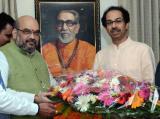New Delhi/Mumbai, Sep 26: After weeks of hardball politics, the two coalitions in Maharashtra — the ruling Congress-NCP and the opposition BJP-Shiv Sena — parted ways in a bitter way on Thursday night, setting the stage for a multi-cornered contest in the upcoming Assembly elections.
 The key players were in a wrangle over the sharing of seats for the 288-member Assembly election with the aim of dominating the political space in the state. Maharashtra goes to polls on October 15 and the last day for filing of nomination papers is Saturday.
The key players were in a wrangle over the sharing of seats for the 288-member Assembly election with the aim of dominating the political space in the state. Maharashtra goes to polls on October 15 and the last day for filing of nomination papers is Saturday.
The BJP, the junior partner in the 30-year-old alliance, was the first to announce the split with the Sena. Within an hour, the NCP walked out of the 15-year-old coalition with the Congress, plunging the state into a political flux. Buoyed by the Modi wave in the Lok Sabha elections, the BJP had been demanding 135 seats from the Shiv Sena while it had contested 119 seats in the 2009 Assembly elections.
BJP leaders have been contending that Sena’s position in the state had diminished following the death of its founder Bal Thackeray in 2012, a claim which did not find favour with its chief Uddhav Thackeray.
“The Shiv Sena-BJP alliance, which lasted over 25 years, has ended,” Maharashtra BJP leader Eknath Khadse told reporters at the party office in Mumbai.
“Even now, we and many in the Maharashtra BJP do regret that vested interests have prevailed over unity,” Aditya Thackeray, the 24-year-old son of Uddhav, posted on Twitter.
The Shiv Sena is the second ally after the Haryana Janhit Congress to part ways with the BJP after its spectacular success in the Lok Sabha elections. However, Sena’s lone representative in the Union Cabinet Anant Geete said the alliance would continue at the Centre.
On the other hand, the NCP was demanding an equal share from the Congress. The NCP, which won four seats in the recent Lok Sabha elections, argued that the influence of the Congress is limited as the party managed to secure only two seats.
Announcing the NCP-Congress split, Deputy Chief Minister Ajit Pawar accused Chief Minister Prithviraj Chavan of ignoring the alliance partner of 15 years and creating an atmosphere of distrust.
Pawar also announced that the NCP was withdrawing support to the state government and he will meet Governor Ch Vidyasagar Rao to submit his resignation.
“Unbelievable and unimaginable has happened. Ekla chalo won; all four parties lose at least something. But politically best way to grow strong,” Congress spokesman Abhishek Manu Singhvi said.
Earlier, the first signs of an impending separation in the saffron alliance came as BJP president Amit Shah cancelled his visit to Mumbai on Thursday even as last minute efforts were on to save the coalition.
The seat sharing talks between the Sena and the BJP witnessed several twists and turns.
The alliance was finalised two days back only to be rocked by minor partners who were not willing to accept the “raw deal” offered to them.
The Sena had kept 151 seats for itself, offering 130 to the BJP while leaving seven seats to the four minor parties — Swabhimani Paksha, RPI (A), Rashtriya Samaj Paksha and Shiv Sangram.
According to an earlier proposal, the Sena had 151 seats, BJP 119 while the four minor parties had 18. Another bone of contention between the BJP and the Shiv Sena was the post of the chief minister.
Sena had staked claim to the post citing the agreement between Bal Thackeray and BJP leader Pramod Mahajan, who had first struck the alliance in the 1980’s. BJP was keen to have the post contending that it had been performing better than the Sena in the state elections.
In the current Assembly, the BJP has 46 members as against 45 of the Sena. The superior performance of the BJP in the 2009 elections had resulted in the nomination of its leader Eknath Khadse as the Leader of the Opposition in the Assembly.





Comments
Add new comment